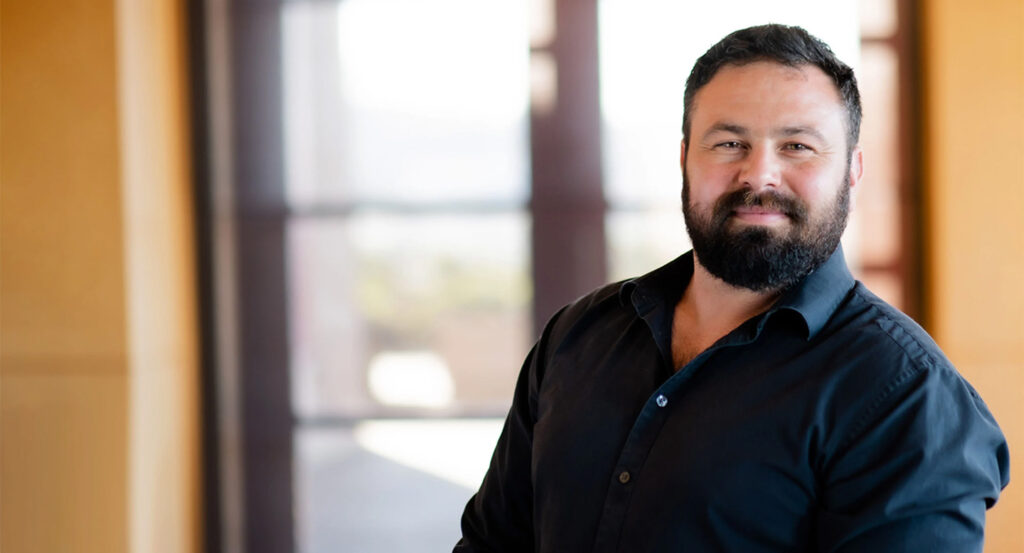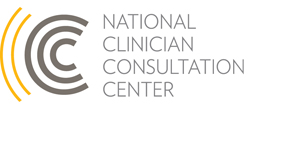NCCC Clinician Spotlight: Kevin Miles, NP, MSN, AAHIVS

Kevin Miles has been a clinician education specialist with the National Clinician Consultation Center (NCCC) since 2015. In both his role as a clinical educator at the NCCC and practicing clinician at the 360 Wellness Center at the University of California, San Francisco (UCSF), Kevin’s goal is to empower people with HIV and their providers.
If HIV care is a team sport, then Kevin Miles, NP, MSN, AAHIVS is a captain.
With nearly a decade of experience as a nurse practitioner (NP) in the field, Kevin has helped countless people with HIV, substance use disorders (SUD), and viral hepatitis navigate their challenges together. He leads with compassion, strength, and grace, reassuring people they are on the same team, working toward the same goal, and getting through what can be the hardest moments of their lives. He brings the same sensibility to his clinical education career at the NCCC.
Kevin succeeds as a captain by building the confidence of the people around him. He wants the people he cares for to know they are not helpless and that there are always options within their control. With fellow providers, he wants them to trust the science and their own clinical experience to guide their decision-making.
“Being an empowering provider is being able to provide data,” Kevin said in a recent interview. “For clinicians, it lets them confidently express to the people they care for that their medication is working well, or that they’re not at risk of transmission to their partners.”
Kevin’s team-like approach should come as no surprise. A native of Antioch, CA in the Bay Area, he grew up in a family centered around sports and science.
His father was a lab bacteriologist and former boxer who once sparred George Foreman and went 5-0 in his professional fighting career. He built a batting cage in the yard and designed a home gym for Kevin and his brother to train. His brother, who played nine seasons in Major League Baseball (MLB), is the manager of the Oakland Ballers, a new Pioneer League team.
Kevin also played football and did track and field, but ultimately found his passions lay in science. He majored in molecular biology in undergrad at California State University, East Bay and was a pharmacy technician before becoming an NP.
Kevin also leads by example – another quality of a good leader.
When faced with a challenging diagnosis, he calls upon his own experience living with HIV to offer a reassuring voice in a moment of fear. His diagnosis is what inspired him to pursue a career as an HIV care provider – and offer empowerment, not dread, to those who need it.
‘The Consultation I Wish I Had Gotten’
As Kevin recounts, when he was first told he had tested positive for HIV more than 20 years ago, it was by a test coordinator at a university. As he was processing the news, the coordinator blankly handed him a pamphlet that highlighted the newfound dangers of his condition.
One piece of information from the pamphlet jumped out to Kevin, and has stuck with him to this day: As someone with HIV, he had to watch out for salad.
While it was true that Kevin had to be mindful of diseases like listeria, the coordinator failed to provide additional context, encouragement, or any sort of reassuring information on antiretroviral (ARV) medications, Kevin says.
“Having that negative experience really impacted me, where, in the moment I found out I was HIV-positive, somebody with incomplete knowledge made me feel more at-risk, more vulnerable than I needed to feel,” Kevin said.
As Kevin grappled with his diagnosis, the fear of salad became a symbol for his frustrations. He had skipped his first test result appointment because he was so nervous, and this experience had confirmed his fears.
“People can feel like a failure when they realize they got HIV. Telling them a salad is a dangerous thing to eat adds to that feeling,” Kevin said.
Because of this, Kevin struggled with the perception that he was going to be immunocompromised for life. Today, he looks back and understands that even though it was early in the era of ARVs, if this coordinator was as knowledgeable as he could have been, he could have shared about their effectiveness and completely changed Kevin’s outlook.
“It’s important for people to understand that, yes, you have HIV, there are a few things you’ll be at slight increased risk of. But if you are properly virally suppressed, for the most part your immune system functions the same,” Kevin said.
As Kevin learned more about his condition, he still reeled from the experience. Eventually, he decided to make a change, and step up to the plate in a new way.
Fascinated by the molecular world of HIV, Kevin briefly pursued biotechnological studies in hopes that he could help find a cure before realizing he could make a bigger impact on the lives of people with HIV by entering the public health field. Working as a test counselor and research associate at the San Francisco Department of Public Health’s then- “AIDS Office” on Van Ness Street, Kevin immersed himself in several studies that investigated ways of reducing HIV transmission with an emphasis on substance use management.
Kevin then enrolled in UCSF’s School of Nursing, where he specialized in HIV care and earned his Master of Science in Nursing (MSN) and NP certification. It was during this time he joined the NCCC, where he says mentors gave him foundational skills in person-first communication while discussing personal issues with people in care and other providers.
“Once I decided to go into health care, I was able to give people with a new diagnosis the consultation I wish I had gotten,” Kevin said. “Now, I’m the one who tells people, ‘Hey, there’s really good medications out there.’ Telling someone they can still live a healthy life can help them to be more positive moving forward.”
Empowerment Through Understanding – Tips for Clinicians
Kevin has several pieces of advice for clinicians who may be uncertain around the best practices for HIV care – much more than we can fit here (although he says to “call the NCCC for more”).
As he explains, between rapid advancements in HIV treatment and the overwhelming history of HIV in general, it’s understandable for providers to feel daunted. So, it’s important to simplify care concepts when possible. Kevin says remembering the number 200 can help with this.
“In conversations with providers, I often highlight the importance of the number 200 in HIV care,” Kevin said.
First, when evaluating the health of someone’s immune system, HIV providers largely rely on the CD4 count – a type of white blood cell also known as a “Helper T Cell” that is crucial to immune defense. Once the absolute CD4 count dips below 200, that person is diagnosed with AIDS and is at risk of deadly opportunist infections (OIs), he says.
Next, when assessing whether a current HIV regimen is working well, providers measure the viral load. If the viral load cannot be maintained under 200 copies of the virus per mL of blood, then the current medication is failing, and resistance testing should be done to help decide the best next steps, Kevin says.
Lastly, the number 200 also relates to the important concept of U=U.
“U=U stands for ‘undetectable equals untransmittable.’ It’s a catchy and empowering phrase that has immeasurably reduced stigma by helping those living with HIV better navigate sex and love, while keeping their partners safe from HIV infection,” Kevin said.
The concept refers to studies that show anyone with HIV on an antiretroviral therapy (ART) regimen who has less than 200 copies/mL of the virus – the lowest level that older HIV viral load testing assays could detect – has reached virological suppression (an “undetectable load”).
This means anyone with a viral load less than 200 copies/mL cannot pass on HIV during sex of any kind, whether oral, vaginal, or anal, even if their partner is not on pre-exposure prophylaxis (PrEP). Thus, Undetectable = Untransmittable.
However, as Kevin explains, U=U is not technically accurate anymore thanks to modern viral load testing assays being much more sensitive. Today, assays can detect levels of HIV down to 20 copies/mL.
“Now, a more accurate, and cumbersome, statement would be: A viral load less than 200 copies per mL = untransmittable,” Kevin said.
Understanding this history can help providers reassure their clients that, despite their viral load being detected at 36 copies/mL – and not technically being undetectable – they are not at risk of transmitting HIV to their sexual partners, Kevin says.
“Clinicians and people in care alike can be very uncomfortable with this idea,” Kevin said. “What I explain is that we have good data that shows people are at no risk of transmission as long as their viral load stays under 200 copies/ml. No regimen changes are needed.”
Tying in these two important measurements – CD4 count and viral load – Kevin says it’s important to note that people with AIDS (CD4 counts below 200) but who are virally suppressed (less than 200 copies/mL) are at much lower risk of OIs compared to those with higher viral loads.
“Lots of the data we have regarding the risk of OIs is outdated and comes from an era when most people with AIDS were also viremic. Today, the guidelines have been updated to reflect the positive impact of viral suppression even on those with AIDS based on a CD4 count below 200.” Kevin said.
Overall, Kevin wants everyone in the HIV care continuum, both people with HIV and their providers, to know that people are a lot more durable than they might realize.
“It may be anxiety-inducing, but there are multiple ways to feel comfortable and confident with HIV. You have options,” he said.
Kevin Miles provides case-based clinical education to NCCC callers on HIV, perinatal HIV, hepatitis C, and pre- and post-exposure prophylaxis (PrEP and PEP).
 University of California, San Francisco |
University of California, San Francisco |
